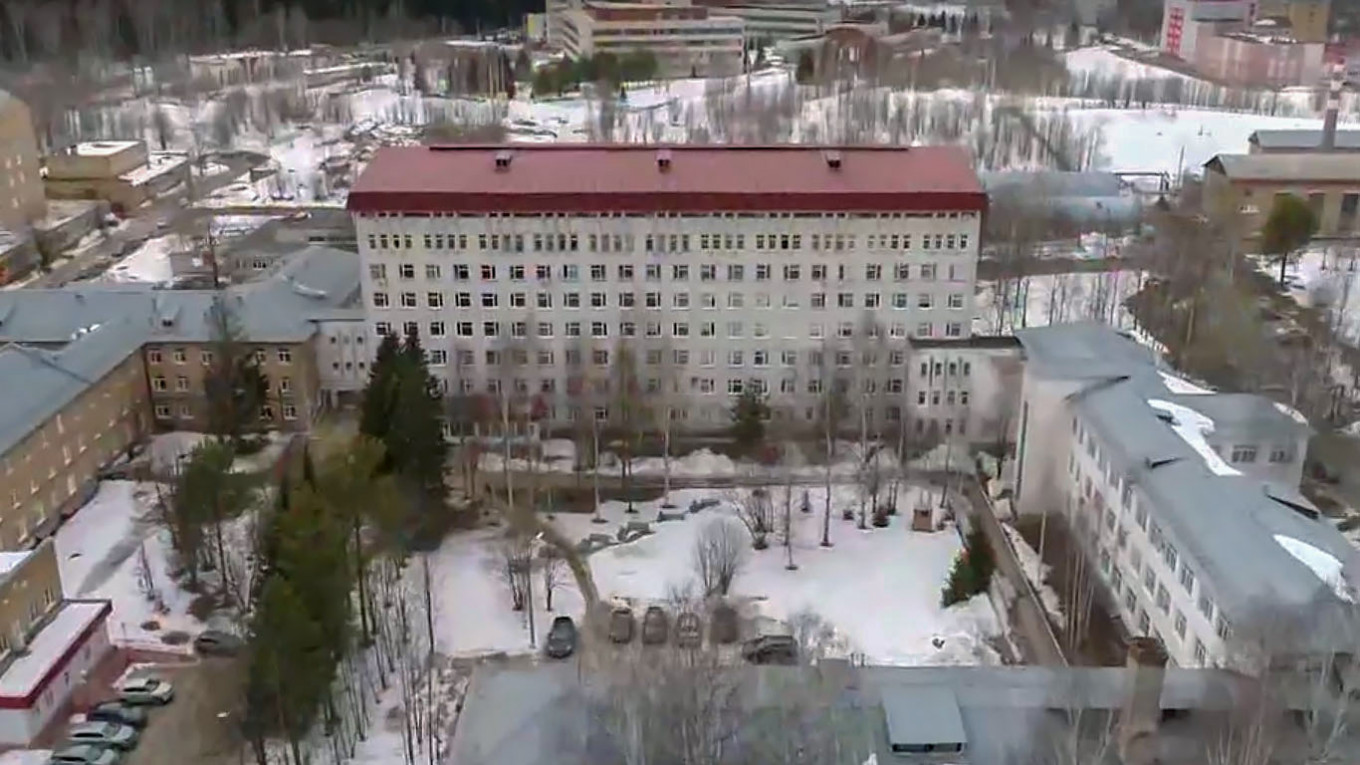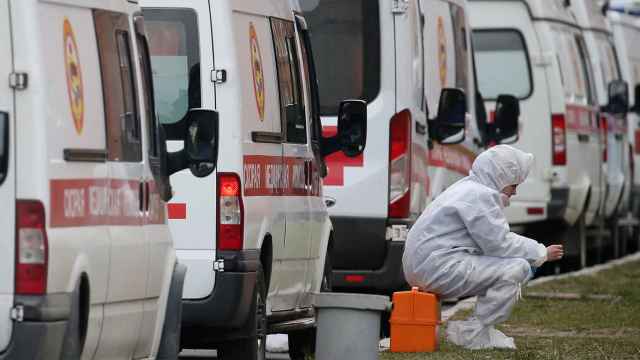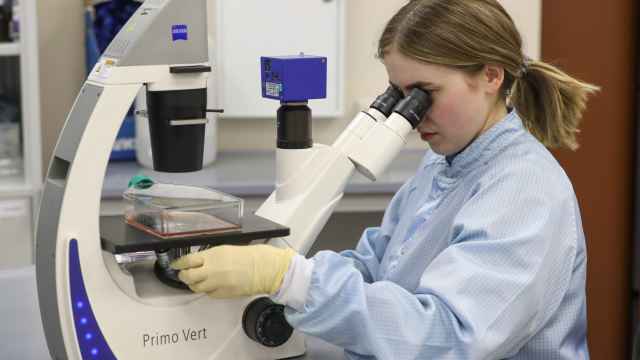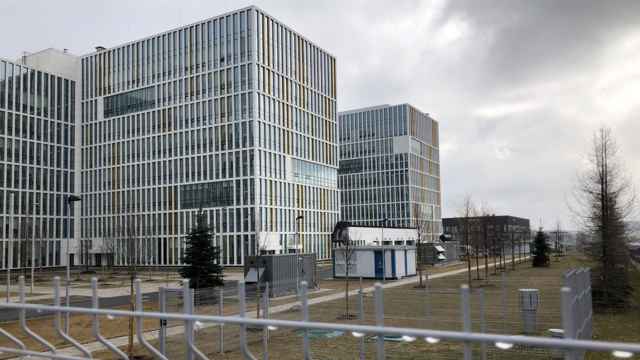On March 21, the New England Journal of Medicine published an article by a group of doctors who had for weeks been treating coronavirus patients in the small city of Bergamo in northern Italy, the European epicenter of the pandemic.
“We are learning that hospitals might be the main Covid-19 carriers,” the Italian doctors wrote. “They are rapidly populated by infected patients, facilitating transmission to uninfected patients.”
Three days later, a hospital in Russia’s northern republic of Komi not meant to be treating coronavirus patients would be put under quarantine after an outbreak of the virus infected its staff. By Wednesday evening, another five hospitals not set to take in coronavirus patients would likewise have to be put under quarantine due to outbreaks.
Although Komi is sparsely populated with some 900,000 people and is one of Russia’s more remote regions, it has quickly become one of the country’s coronavirus hotspots. With 150 cases, it is the second most infected region per 100,000 residents after Moscow, the country’s most populous city. Officially, Komi has had three deaths due to the virus.
“It appears that Syktyvkar could very well end up in the unenviable role of the Russian Bergamo,” Ernest Mezak, a journalist turned lawyer at the Public Verdict human rights group who is conducting an investigation into the outbreak in Komi, wrote on Facebook in late March in reference to the region’s capital city. The city is home to the republic’s two main hospitals.
Since the Italian doctors’ initial warning, public health officials around the world have sounded the alarm that healthcare workers could be superspreaders of the virus. Once infected, experts say, medical workers can accelerate the virus’ advance and undermine the ability of their health systems to fight the pandemic.
Interviews with Komi doctors, supported by local news reports and Mezak’s investigation, indicate that this was the case in the republic. From doctors becoming infected, to infected patients being moved from one hospital to another, to untested patients being released early, the root of Komi’s growing crisis appears to be its medical system.
Infected health workers
Just after 6:30 pm on March 24, a report surfaced on a Komi news site that the Ezhvinskaya district hospital in Syktyvkar was “sealed off” — doctors and patients were not being let out and no one could enter.
The next day, Komi’s health minister confirmed that there were six suspected coronavirus patients at the hospital, including a doctor, even though the hospital was not taking in coronavirus patients. The doctor was also outed as the suspected patient zero.
On March 26, a copy of a letter purportedly sent from the regional prosecutor’s office, the authenticity of which The Moscow Times was unable to verify independently, became public. The letter said that six people at the hospital had the coronavirus, including Andrei Kern, the head of the surgical department, as well as his wife and father-in-law.
Soon, the hospital would become a hotspot of the coronavirus, with 48 people on site confirmed to have it.
“The Ezhvinskaya district hospital, a transmission vector of the coronavirus, is sealed and is under our full control,” the region’s health minister Dmitry Berezin said at the end of March.
But that wasn’t the case.
A few days earlier, the hospital had begun moving patients to other clinics.
On March 25, five coronavirus patients were transferred to Syktyvkar’s Komi Republic Infectious Diseases hospital, which had been earmarked for coronavirus patients in the region. One was an Ezhvinskaya district hospital staffer, 61-year-old Tatiana Avanesyan, who died from coronavirus complications six days later.
At least some patients, however, were also reportedly sent on to another hospital that hadn’t expected to receive coronavirus patients.
Main transmission vector
According to Mezak and a doctor at the hospital who spoke with The Moscow Times, a number of patients who were not exhibiting coronavirus symptoms but still needed to be treated for various ailments were transferred to Syktyvkar’s Komi Republic Clinical Hospital — the main medical hub for the sprawling region.
Three other doctors at Komi Republic Clinical Hospital who spoke to The Moscow Times said they had heard that patients were moved to the hospital — but, they added, they did not have evidence that this was the case.
Komi Republic Clinical Hospital did not respond to multiple requests for comment for this article.
Regardless of how the coronavirus arrived, it soon upended life at the key hospital.
Another doctor at the hospital who asked to remain anonymous told The Moscow Times that medical staff found out through hearsay at the end of March that a patient at the hospital had tested positive for the coronavirus.
The patient, the mother of the head of the vascular surgery department, eventually died from the virus at the hospital on April 4.
After her death, the only measures the hospital took to contain the virus’s spread was to shut down a laboratory on the same floor as the intensive care unit and send the lab staffers home, the doctor said.
Two days later, nine people, including medical staff, in six of the hospital’s departments tested positive, the independent Novaya Gazeta newspaper reported Monday.
The paper added that the Health Ministry is now planning to test everyone who was released from the hospital between March 20 and April 4.
But the virus would have already spread widely: Komi only announced self-isolation measures to limit the spread of the coronavirus starting March 31.
‘Viral bomb’
While it’s not clear how the coronavirus made its way into Komi Republic Clinical Hospital, it’s not a mystery that coronavirus patients moved on to other hospitals from there, spreading the virus around the region.
“This hospital treats all of Komi — we’re talking about a territory equal to Austria and Germany taken together,” Mezak told The Moscow Times. “They bring patients here from all the villages and towns to this one hospital. Patients that came into contact with the virus at the hospital and were then released spread it around the whole republic.”
That happened quickly.
On April 1, a woman who Mezak said was treated at Komi Republic Clinical Hospital in mid-March checked into a local hospital in the Knyazhpogostsky District, 125 kilometers north of Syktyvkar. She died from the coronavirus two days later. The hospital has since been put under quarantine and three of its medical workers have been hospitalized with suspected coronavirus.
That same day, a woman was admitted to a local hospital in the town of Ukhta, 315 kilometers northeast of Syktyvkar, with pneumonia. She had been released from Komi Republic Clinical Hospital a week earlier, on March 24. On April 5 she tested positive for the coronavirus.
The Ukhta hospital is now treating five more suspected coronavirus patients. The hospital has been placed under quarantine and local officials have said they are looking for anyone who was treated in Komi Republic Clinical Hospital between March 20 and April 5.
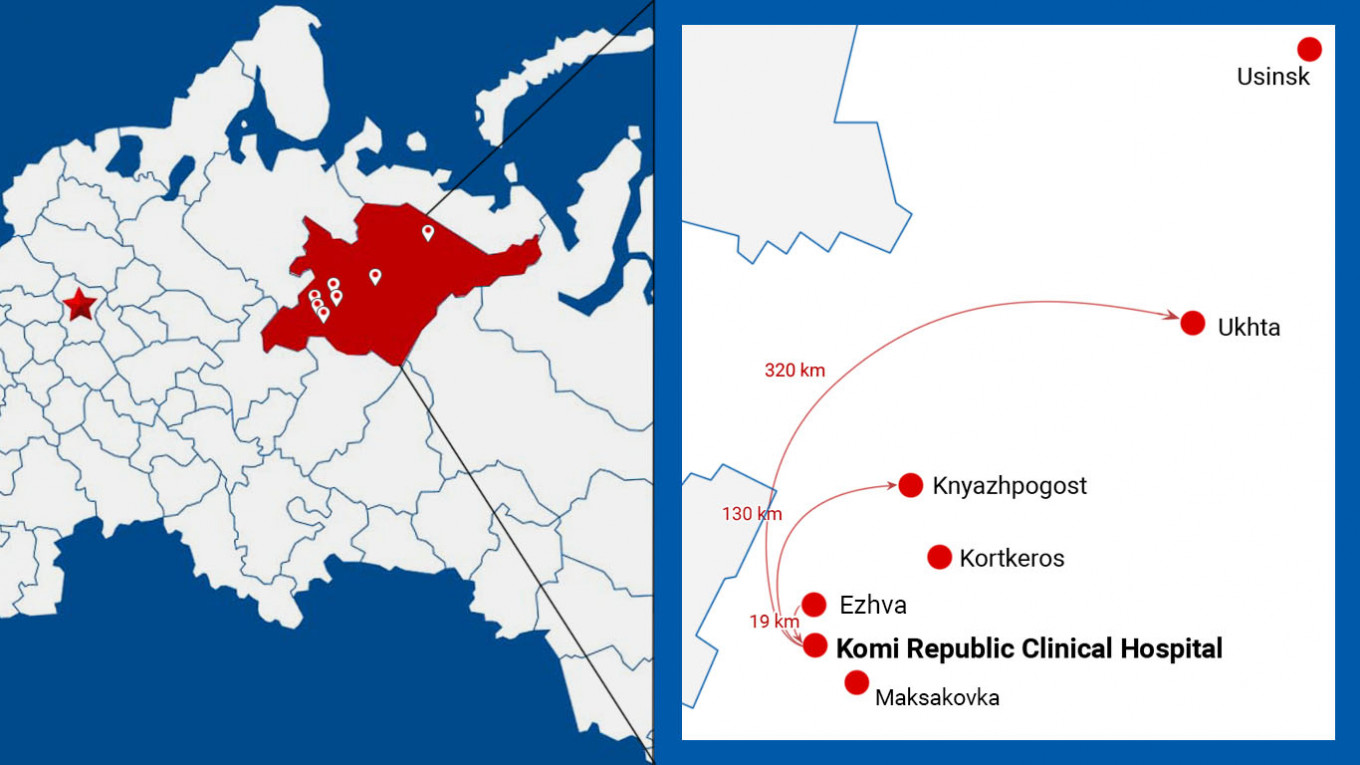
In an audio recording shared with The Moscow Times, a medical worker at the local Ukhta hospital pleads with her fellow town residents to stay home.
“Here’s the thing: at least 76 people at the hospital were in contact with her,” the woman says. “And they were going home to their families and to stores and then going back to work.”
A medical worker at a state institution in Komi who asked for anonymity to avoid retribution described the situation at Komi Republic Clinical Hospital as a “viral bomb.”
Ukhta’s local hospital isn’t the only medical institution to have been caught by surprise.
On Tuesday evening, a hospital in the village of Kortkeros was placed under quarantine after a woman there was found to have the coronavirus.
And early Wednesday evening yet another Komi hospital, in the town of Usinsk, was put under quarantine after one of its doctors tested positive for the virus — bringing the total number of hospitals under quarantine in Komi to six.
Overwhelmed healthcare systems
The republic is now planning for the worst.
On April 3 it opened an emergency government tender for 13 new ventilators used for treating serious coronavirus cases.
Two days later, on April 5, the interim governor — the preceding governor was fired on April 2 — announced that he would be increasing testing capabilities.
That same day, the Komi Infectious Diseases Hospital put out a call for new doctors. But with doctors already infected and regional health minister Berezin admitting in November that the republic has 3,000 fewer doctors than it needs, new staff may be hard to come by.
Meanwhile, one of the doctors at the Komi Republic Clinical Hospital told The Moscow Times that medical staff were not prepared to deal with the coronavirus and that they lack adequate personal protective equipment (PPE).
Since the head of the vascular surgery department’s mother tested positive for the coronavirus in late March, some medical workers have been sleeping at the hospital to ensure they don’t spread the virus to their families, the doctor said.
The hospital is in “bedlam,” he added, noting that medical staff are “stressed and angry.”
During a primetime news report on state television channel Rossiya-1 Wednesday evening, another doctor at the hospital who had her face blurred echoed that medical staff don’t have adequate PPE.
“Medical workers are already sewing masks themselves,” she said. “Soon we will run out of disinfectant.”
The worry for Russia is that other regions could follow Komi. In recent days, hospitals in Ufa, the annexed Crimea peninsula and the Moscow region have announced they will be shutting their doors for quarantine.
The regions might do well to follow the Russian capital’s example, which has begun treating mild cases of the coronavirus over video call.
Indeed, returning to the example of Italy, many patients, in retrospect, may have been better left at home.
Weeks after the coronavirus began devastating Italy, two neighboring regions, Lombardy — home of Bergamo — and Veneto, the first centers of the outbreak in the country at the end of February, have offered lessons for other countries still coming to grips with the virus.
Unlike Lombardy, Veneto focused on treating patients at home rather than in hospitals, the Financial Times reported this week. While Lombardy accounts for more than half of the country’s over 15,000 declared coronavirus deaths, Veneto saw only 607 official deaths.
“The more patients you admit to the hospital,” Giorgio Palù, one of Europe’s leading virologists, told the paper, “the more cases you get.”
A Message from The Moscow Times:
Dear readers,
We are facing unprecedented challenges. Russia's Prosecutor General's Office has designated The Moscow Times as an "undesirable" organization, criminalizing our work and putting our staff at risk of prosecution. This follows our earlier unjust labeling as a "foreign agent."
These actions are direct attempts to silence independent journalism in Russia. The authorities claim our work "discredits the decisions of the Russian leadership." We see things differently: we strive to provide accurate, unbiased reporting on Russia.
We, the journalists of The Moscow Times, refuse to be silenced. But to continue our work, we need your help.
Your support, no matter how small, makes a world of difference. If you can, please support us monthly starting from just $2. It's quick to set up, and every contribution makes a significant impact.
By supporting The Moscow Times, you're defending open, independent journalism in the face of repression. Thank you for standing with us.
Remind me later.




